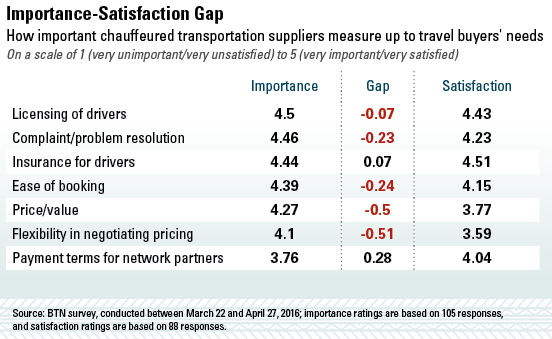
Pricing pressure from ridesharing competitors is cutting
into corporate travel buyers' satisfaction with chauffeured suppliers, even
though buyers rank safety and security at the top of their priorities.
In a survey conducted alongside BTN's 2016 Car Rental
Survey, buyers named licensing, problem resolution and insurance as the most
critical components of their chauffeured programs. Those also were the three
areas in which buyers were most satisfied with their preferred chauffeured
suppliers, though complaint/problem resolution lagged behind the other two.
Buyers' emphasis on those areas is not surprising, as they tie into a company's
liability for employee safety, DK Consulting CEO Dave Kilduff said. "When
choosing ground transportation, your first choice should be safety, proper
background checks, drug and alcohol testing, proper liability, making sure the
vehicles are safe and the drivers have good training," He said. "You're
covered and you're safe; you can't do more than that."
The greatest differential between importance and buyer
satisfaction, however, appeared in pricing: a half-point gap for each negotiating
transient pricing and overall price/value. Sharing economy suppliers like Uber
and Lyft were a clear factor, as several buyers cited those services' lower
prices. "A lot of our travelers are choosing to use Uber Black due to the
lower cost for a similar product," one buyer said. "I would prefer to
use our current company for these services, so I would love to see similar
pricing." Kilduff countered that duty-of-care considerations like FBI
background checks for drivers contribute to that extra cost: "You have to
pay for safety." He also said the price differential isn't that big
between high-tier ridesharing services and chauffeured suppliers, not to
mention surge pricing.
BTN found a smaller gap between the importance of and
satisfaction with ease of booking chauffeured services. Buyers wanted suppliers
to improve technology not just for bookings but also for other areas, such as
billing and reporting. One lamented that it "still seems very much mired
in a 1970s paper mindset."
While large suppliers like Carey International have invested
in technology, including new apps and websites, the industry remains quite
fragmented with small suppliers that do not have the budgets for large-scale
investments. Even larger companies often use affiliates that might have
separate technology platforms, Kilduff said. "They're far behind rental
cars, which is a much smoother booking process because they're all on one
system," he said. "Much more is being done manually on the limo
side, and when things are done manually, breakdowns can happen."
Some travel managers told BTN their travelers' use of
ridesharing services has ticked up slightly over the past year, while others
reported larger increases, including some that said executives were using ridesharing
in lieu of black cars and that they are looking to add such services to their
managed programs. Meanwhile, there are still holdouts. "We are still leery
of the legality of these services, and we have duty-of-care concerns due to the
gaps in their insurance and inability to properly vet drivers," one buyer
said. "However, employees do use them, despite restrictions."
Kilduff said those who are not putting in
policies around ridesharing are doing so at their own peril. "This is the
most ignored category because it's hard to manage properly and a lot of
corporations are not willing to mandate it, but it's something you have to do
to protect people in a corporation," he said. "It's like herding
kittens, but you need to herd them."